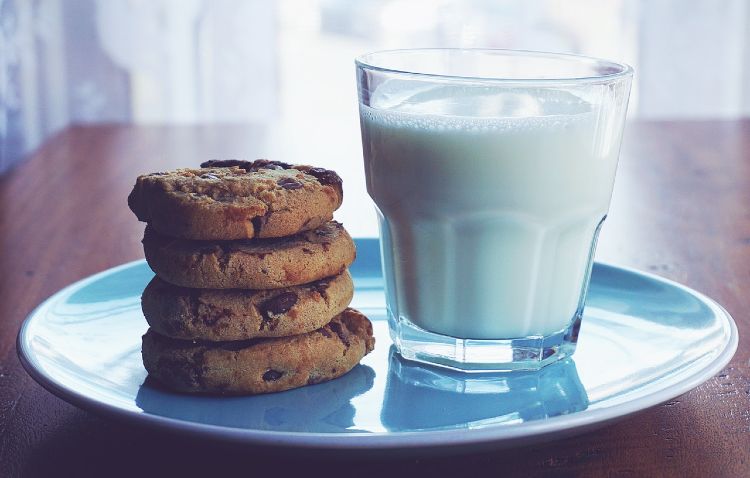Paul Thomas, Cheesemaker at Lyburn Farm
Paul Thomas’s arms are buried under about a metre of milk and curds, his hands moving in very gentle rotating movements, his eyes cast downwards. He is separating curds and whey in a stainless steel vat that is filled with 2100 litres of warm milk.
“The curds are very brittle initially, and the fats, proteins and minerals are getting lost in the whey. When we get to the point that the whey starts looking a little bit greeny – yellowy then this means that we have not lost too much fat from the curds,” he tells me.
It’s the careful balance of the natural ingredients that are in the milk, as well as the humidity of the room, the temperature in the vat and the maturation of the cheeses that come together to create the deep flavours of Lyburn Gold, Old Winchester and Stoney Cross cheese. “And also time,” Paul adds, “it is time and ripening, which are also linked to brushing, turning and coating, that give our cheeses depth of flavour.”
The journey to becoming head cheesemaker at Lyburn Farm, near Landford, just south of Salisbury, has been one of organic, natural progression. Paul studied Biochemistry at Dundee University, a discipline, he says, that has stood him in good stead in cheesemaking:
“You need to understand the science and the molecular structure of cheese in order to make it properly,” he told me.
After graduating he worked for Scotland’s oldest wine merchants and then for Ian Mellis Cheesemongers in Edinburgh, as an affineur, managing the maturation of all the cheeses, for four years. “It is as if everything I have ever done in my life was really leading me to being a cheesemaker. It is where I am happiest: with my hands buried in milk!” Paul acknowledges.
He then met Mike and Judy Smales, the owners of Lyburn Farm, who have been looking after dairy cattle here since 1969. Ten years ago they decided to diversify within the organic dairy farming industry as the price for milk sunk to an all-time low. By adding value and moving into cheese production as well as selling pumpkins and other fresh vegetables in box schemes such as Riverford and Abel and Cole, they have created a successful artisanal food production hub that has seen them win many national and international awards. They are wholesalers to some of the area’s most successful pubs and restaurants.
The job of making artisanal cheese is not for the faint hearted or the physically weak. From the nearby village he rides to the farm on his bicycle to start the 6am shift. He knocks out the cheeses, tips them out of their plastic moulds, washes and sterilises the entire room and all the equipment, flushing all the pipes with boiling water. Shifts are long and hard and you need a great deal of stamina to keep pushing on.
Mike arrives at 7am with the fresh milk, and it is passed through a pasteuriser for about 15-16 seconds at 72 degrees Centigrade. The milk then flows through a pipe in the wall, into the clean vat. The temperature of the room where the cheese is made is 30-33 degrees Centigrade, the air extremely warm, humid and closed. It takes one and a half hours to fill the entire vat.
Paul then stirs in a freeze dried starter culture as well as a vegetarian rennet. He tells me:
“We have found a niche for ourselves in creating a vegetarian, Gouda-style cheese, which is quite hard, quite crumbly and can be used like a grating cheese, for example, to substitute Pecorino or Parmiggiano Reggiano, which both use animal rennet.”
My own journey to Lyburn Farm actually began when I taught an Italian cookery course at the Demuths cookery school in Bath, as all the ingredients in the school are vegetarian. I tasted Old Winchester for the first time and found it quite salty, nutty, brittle and full of flavour. I was hooked and decided there and then that I must meet the maker.
One of the reasons why the cheese is so flavoursome is because the herd, comprising of 180 Holstein X Friesian cattle, is being bred more towards to the native Friesian breed direction. The milk of Friesian cattle is particularly prized for its rich fats and proteins.
“Cheesemakers and consumers are much more demanding now,” explains Paul. “We have seen a huge renaissance in the last decade in the British cheesemaking industry: there is a great fascination with the artisanal process and a wider interest in experimentation. Now washed rind cheeses, Vacherin, Comte and cheeses with a greater depth of flavour are much more in demand than ever before,” Paul told me.
He is now holding some cut curds for me to see in the palms of his hands. They look and feel much tighter and more solid. He moves his thumbs and little fingers to break them up and I can see the whey oozing out. He drains the whey out of the vat, and as it runs out of the vat and into an outside tank, he washes the curds with clean water from a hosepipe.
“The starters turn the lactose in the milk into lactic acid, so by washing the curds we are actually reducing the acidification of the cheese. The ideal target is 5.2% acidity. This is why our cheeses are slightly sweeter, there is an absence of lingering acidity on the palate,” he explains.
The whey, which in Italy is used to make ricotta, is fed to the dairy herd instead, or in some farms is used to feed pigs.
Paul collects the curds with a plastic jug, places them carefully into their cloth lined draining moulds and they are left to sit there for 18-24 hours. The Stony Cross cheese he is making with these particular curds is quite similar to a Tomme de Savoie cheese, and comes in a small, pre-packaged size for Christmas.
There are several cheese ripening rooms in the building, and Jess Roach, who is in charge of the sales, packaging and storage side of the business, takes me through the process. The cheeses stay in the first storage room for about 10 weeks, and in the second storage room they ripen for a further 9 months. She lets me squeeze the cheeses through their crusts and I can feel that the more mature the cheese the less the yield to the touch.
The Stoney Cross cheese (named after a World War II airfield nearby) does not have a cover, it goes into storage fresh and as a result develops a kind of moleskin, velvety “cat fur” on the outside. This is brushed down and the cheeses are turned. Humidity is ensured by running water on the floor and careful control of air temperature.
Lyburn Gold cheese is sold at three months, and although pressed it is still categorised as a semi-soft cheese, at 8-18 months it is sold as Winchester cheese and over 18 months it becomes Old Winchester cheese.
Currently the cheese is sold at the Winchester farmers’ market and can be bought from the shop direct, or online.
I ask Paul whether, when his little two year old daughter Mia grows up and says to her father, “Dad I want to be a cheesemaker too” he would be encouraging, and he tells me that he would be very proud indeed. But what advice would he give to a young person who wants to be a Paul Thomas of the future? His guidance is judicious:
“I would advise that this is a profession that requires complete dedication. I turn one fifth of a tonne of cheese, by hand, every day, and when it is cold, wet and dark, in the depths of winter, you do this job for love alone. You can start either by attending a college, like the School of Artisan Food in Welbeck, where you will get industrial placements and hands-on experience, or by becoming an apprenctice to a cheesemaker. You need to learn as you go along: it takes many months of consistent hard work to understand a cheese fully. You need to develop something new and different and become useful to the industry. I would also recommend that you attend trade shows and food fairs: you will meet the retailers, distributors and consumers of your product. It is through interacting with them that I feel really enthusiastic and passionate about my trade, and I really want to pass this on.”
Contact Details
Website: www.lyburnfarm.co.uk
Follow Paul Thomas on Twitter @wheymaker.


